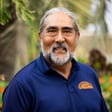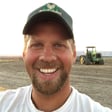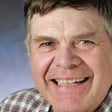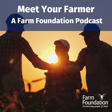
2. Farm Foundation’s Meet Your Farmer Podcast with Amanda Butterfield
Farm Foundation’s Meet Your Farmer podcast featured Amanda Butterfield and her daughter, Evelyn, in season 1, Episode 2.
Amanda Butterfield is director of corporate partnerships at The Meat Institute, and she also owns and operates a farm in Pennsylvania. With her husband and daughter, they raise beef cattle at Maple Valley Cattle Company, a 180-acre cow-calf operation. The farm was recently selected as a finalist for the 2024 Pennsylvania Leopold Conservation Award, which honors farmers and forestland owners who go above and beyond in their management of soil health, water quality and wildlife habitat on working land.
At her farm, Amanda uses strategies like rotational grazing, cover crops, integrated pest management strategies, and has preserved the farm's woodlands and wetlands and native grasslands to improve soil health and support biodiversity.
The conversation covered some of the logistics of rotational grazing and land restoration on the farm, Amanda’s path to farming as a first-generation farmer, and what the future holds for young people on the farm today.
Find Maple Valley Cattle Company on Facebook: https://www.facebook.com/amcbutterfield2/
See the farm on this video by the Pennsylvania Friends of Agriculture Foundation. https://www.youtube.com/watch?v=jQhbW3MRfeo
Music: "Country Roads" by Sergii Pavkin from Pixabay
Reach us at communication@farmfoundation.org.




